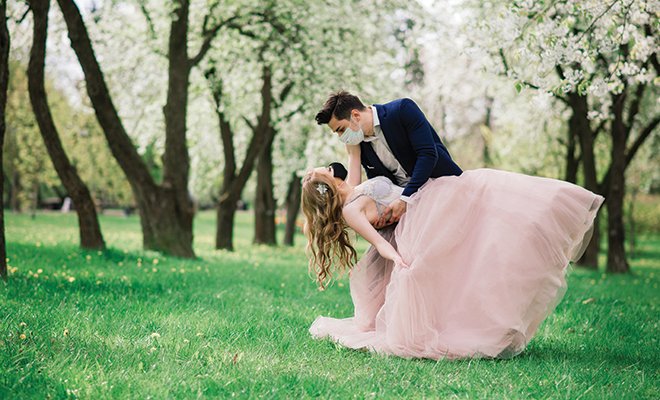
COVID’s Influence on Weddings
I do! Those are the most special words a woman and a man can say in an entire lifetime.
Last summer, two of my girlfriends had daughters who had planned their destination weddings for over a year. The bride’s sister was pregnant, so they made sure the date was far before her due date. When the pandemic raised its ugly head, plans changed, flights were cancelled and a scramble ensued to find an outdoor venue. The wedding was held, and the sister’s baby came just weeks later! Life’s most memorable moments happened all at once.
My other friend held her daughter’s wedding in her own back yard, which was quite special to all who attended. “Through all the planning and tears, I feel having my daughter get married at our home was something we should have planned all along,” she noted. “The love in my husband’s eyes as he walked her down our back yard on the white fabric walkway is something we will never forget.”
These are two examples of the many couples and families now rethinking their wedding plans. As we adapt to circumstances, we can always find a way to accommodate everyone. One idea to consider is separating your guests into categories such as immediate family, college friends, best friends and co-workers. Think about people that you will see every day and those you don’t see very often who are important to you both. From there you can prioritize, keeping the wedding small and letting others know that you will find ways to celebrate with them separately.
A rule of thumb a local wedding planner shared is to simply postpone the big day and never cancel it. “As a wedding planner, I find it important to walk couples through this difficult time and remain calm,” she noted. “Do your best to carry the vision of the couple forward by creating a new game plan for a future date. Speak with your entire wedding team, including the event planner, caterer, venue, musicians, photographer/videographer and others, then begin choosing a date.”
Flexibility is crucial. Since every vendor may not be able to accommodate your new date, first secure the venue and ceremony, then the caterer. Many wedding vendors have a “community over contract” philosophy and are giving clients a 12- to 18-month period to re-book and use their services. Be sure to ask about this option.
When you create your wedding website, include a blurb about the new date so guests can let you know if they can attend on the new date. Keep your out-of-town guests in mind so they can have time to make plans. Also, creativity is helpful when you want to get married now. This means scaling back and perhaps having a virtual wedding with everyone online in different locations. Other couples are deciding to live-stream the wedding for guests unable to attend. This way, you can marry now, then have a full-scale reception next year.
Unfortunately, this pandemic has added extra responsibility when it comes to safety protocols, and many event companies are implementing safety-first guidelines. For example, a mandatory pre-screening survey for all guests is suggested so that any guest who is sick knows to stay home. Any guest who has experienced fever or flu symptoms 96 hours before the event or who has traveled out of the country up to 14 days before the wedding should be asked to stay home. Consider a no-touch policy, which includes kissing, shaking hands and hugging. Venues should prioritize establishing portable hand sanitizing stations at all entrances and exits. Event staff must work with the ceremony and reception venue to ensure that restrooms are cleaned and sanitized throughout the event. This includes railings, doors, microphones and other community objects.
The guest count will probably be smaller, and vendors may be more restrictive. For example, florists may need to source locally due to the impact on the world flower market. For catering, pay close attention to minimum guest counts that could affect pricing. Food service styles such as buffets and stations are not options. An idea is to create plates or boxes already filled with your foods of choice, providing disposable utensils, napkins and hand wipes.
Historically, weddings have had to adapt in challenging times like this one. During World War II, wedding dress makers were forced to petition the government to continue making wedding dresses from silk. Some women made them out of their fiancé’s parachutes.
Romance and weddings have always survived and adapted to the times. Nuptial rites have endured many global challenges. They may be postponed or smaller in guests for the time being, but weddings are definitely here to stay. ■
Sources: theknot.com and honeyfund.com.






